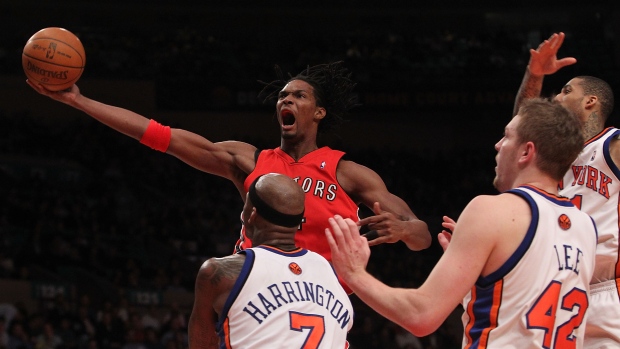Jul 5, 2017
Re-examining Bosh's Raptors legacy
After being waived by the Miami Heat on Tuesday and with his playing days coming to an apparent close, it's time to look back on future Hall of Famer Chris Bosh's Toronto Raptors legacy
TSN.ca Staff

Chris Bosh’s 13-year National Basketball Association career is likely at its end.
Though the 11-time All-Star has expressed interest in continuing to play, his waiving on Tuesday by the Miami Heat, for all intents and purposes, puts a cap on what was undoubtedly a Hall of Fame career. It’s highly improbable that any doctor will clear the 33-year-old Dallas native to resume basketball activities following three years of blood clots that kept him sidelined.
With his playing days coming to a close, it’s time to look back on Bosh’s legacy.
Since joining the Heat in 2010, Bosh was an All-Star in all six seasons he played and helped win two NBA Championships alongside LeBron James and Dwyane Wade as part of the team’s Big Three core. What Bosh brought to the Heat and his impact there are indelible and unimpeachable. Team president Pat Riley has already announced the club’s intentions to retire his jersey.
The more debatable aspect of Bosh’s legacy is his time in Toronto. Taking stock of the seven years Bosh spent with the Raptors is a little bit more difficult to do since the team never reached the tangible benchmarks that the Heat did with him. Where Bosh fits among the all-time Raptors greats is an interesting question.
Looking at it from strictly a statistical perspective, Bosh’s time in Toronto was stellar. Still the franchise leader in rebounds (4,776) and rebounds per game (9.4), his name is found throughout the Raptors record books. Averaging 20.2 points and 9.4 boards in 37.4 minutes a night, Bosh shot .494 from the field over his time with the Dinos. A five-time All-Star, Bosh remains in the Raps’ all-time top 10 in virtually every statistical category.
But to look at what Bosh was for the Raptors, it’s important to note what he wasn’t.
In many ways, Bosh is a conduit in Raptors history. He’s the player who bridged the Raptors from nascent success in the Vince Carter era to the current team led by DeMar DeRozan. Where Carter was all flash, with highlight-reel dunks on the regular, Bosh was the king of the mid-range jumper. Where DeRozan led his team to three-straight division titles and an appearance in the Eastern Conference Finals, Bosh’s teams averaged just over 36 wins a year.
After Carter’s acrimonious exit from the team midway through the 2004-2005 season, Bosh became the face of the franchise. Whether or not he was suited for the role is another story. Not nearly as ostentatious as Carter or, frankly, watchable as the UNC product, Bosh quietly went about his business. That’s not to say Bosh was some sort of emotionless robot, but the fact that he didn’t possess the flamboyance of Carter made him underappreciated in the eyes of fans desperate for panache.
And it certainly didn’t help Bosh that his teams were largely poor. Yes, he was a member of the team that won a then-record 47 games and a first Atlantic Division title in 2006-2007, but there was no postseason success to be had by Bosh. As the No. 3 seed in the 2007 playoffs, the Raptors fell in six games to – who else? – Carter and his New Jersey Nets. The following year, the Raps managed a single victory against an ascendant Dwight Howard and the Orlando Magic who were on their way to an NBA Finals appearance the next year.
But that lack of playoff achievement can’t simply be ascribed to Bosh’s failings. It’s not like he had a sparkling supporting cast in much of his time with the Raptors. The likes of Jamario Moon, Milt Palacio and Joey Graham were receiving hefty playing time in those not-exactly halcyon days.
Yet the enmity leveled at Bosh by the Raptors faithful following his departure for Miami rivalled the rancor received by Carter (and, to a lesser extent, Tracy McGrady). While Carter basically copped to phoning it in during his final days with the Raptors, there were never any questions about Bosh’s professionalism. Never did Bosh dog it and when he left for Miami, he did so as an unrestricted free agent. It was completely within his rights, so for Raptors fans to consistently boo Bosh any time he returned to the Air Canada Centre, it came off as unnecessarily petty.
And consider DeRozan’s response to Bosh’s exit in 2010. While Bosh might have demurred at the prospect of taking over the mantle of face of the franchise upon Carter’s departure, DeRozan embraced the spotlight and the responsibility that came with it when Bosh left.
Perhaps, then, DeRozan’s assertiveness contrasted with Bosh’s relative apathy only served to endear the former and impugn the latter in the eyes of Raptors fans. Still, it’s a shame that the resentment towards Bosh from the ACC crowd didn’t abate in later years like it did with Carter. Of course, there was knowledge that Carter’s career was winding down simply by virtue of his advancing age, but with the relative suddenness of Bosh’s ailment, there was no real sense that Bosh’s trips back to Toronto were numbered.
While he never hit the heights of a Vince Carter or won hearts like DeMar DeRozan, Chris Bosh’s mark on the Toronto Raptors is an enduring one. With Bosh now stepping away from the game, his contribution to the Raptors franchise can now be reconsidered anew and a fair shake can be given to one of the finest players to wear the jersey.
